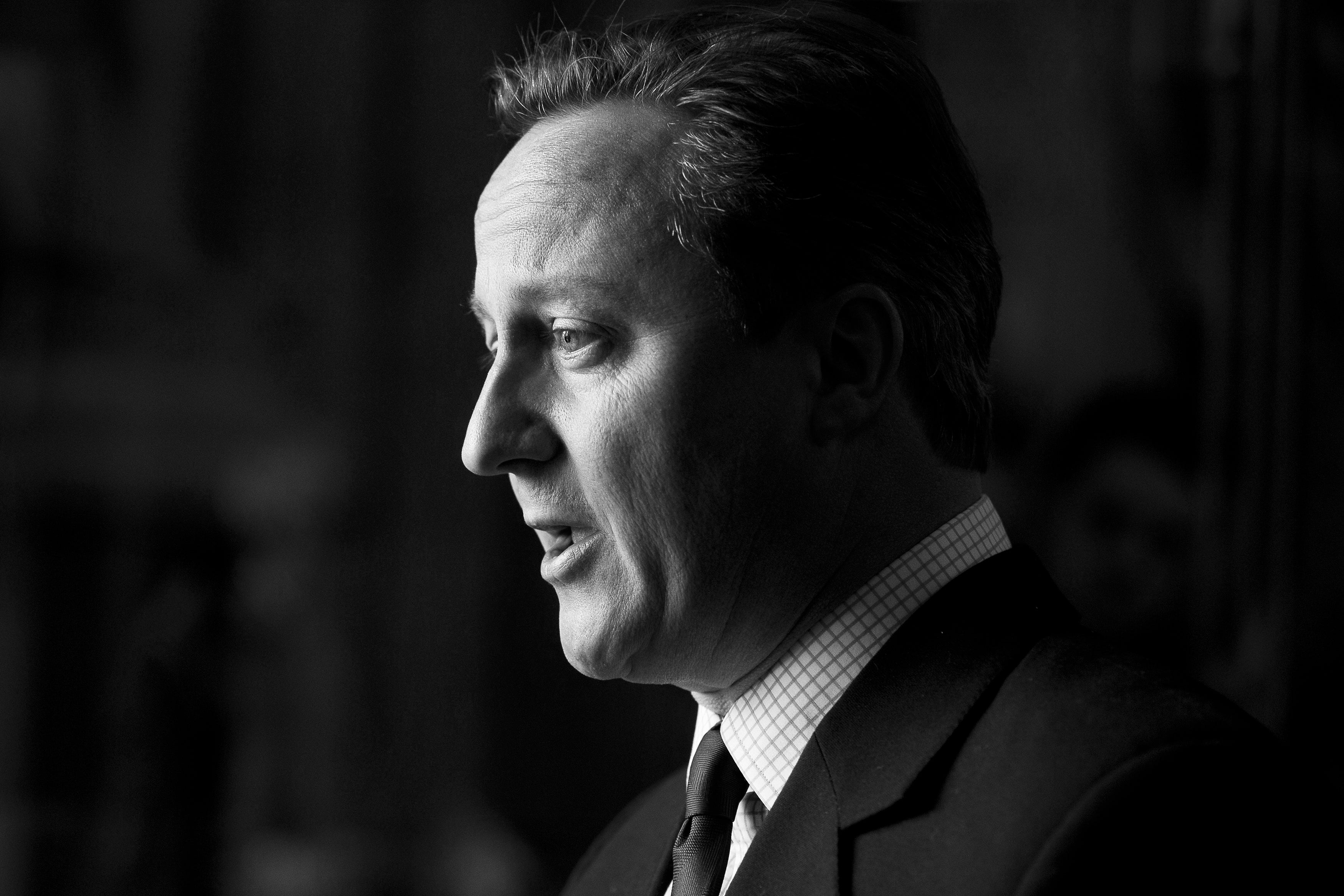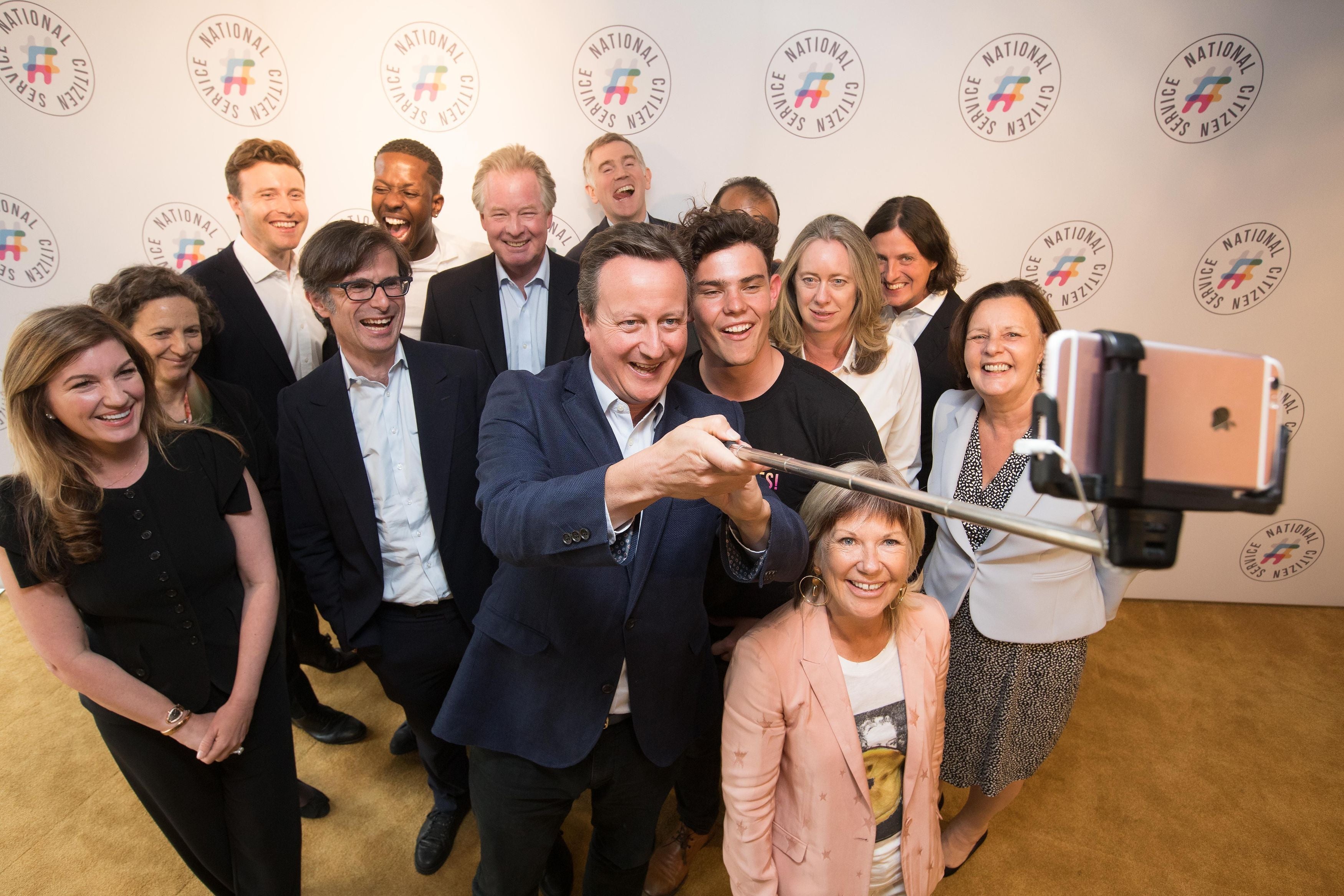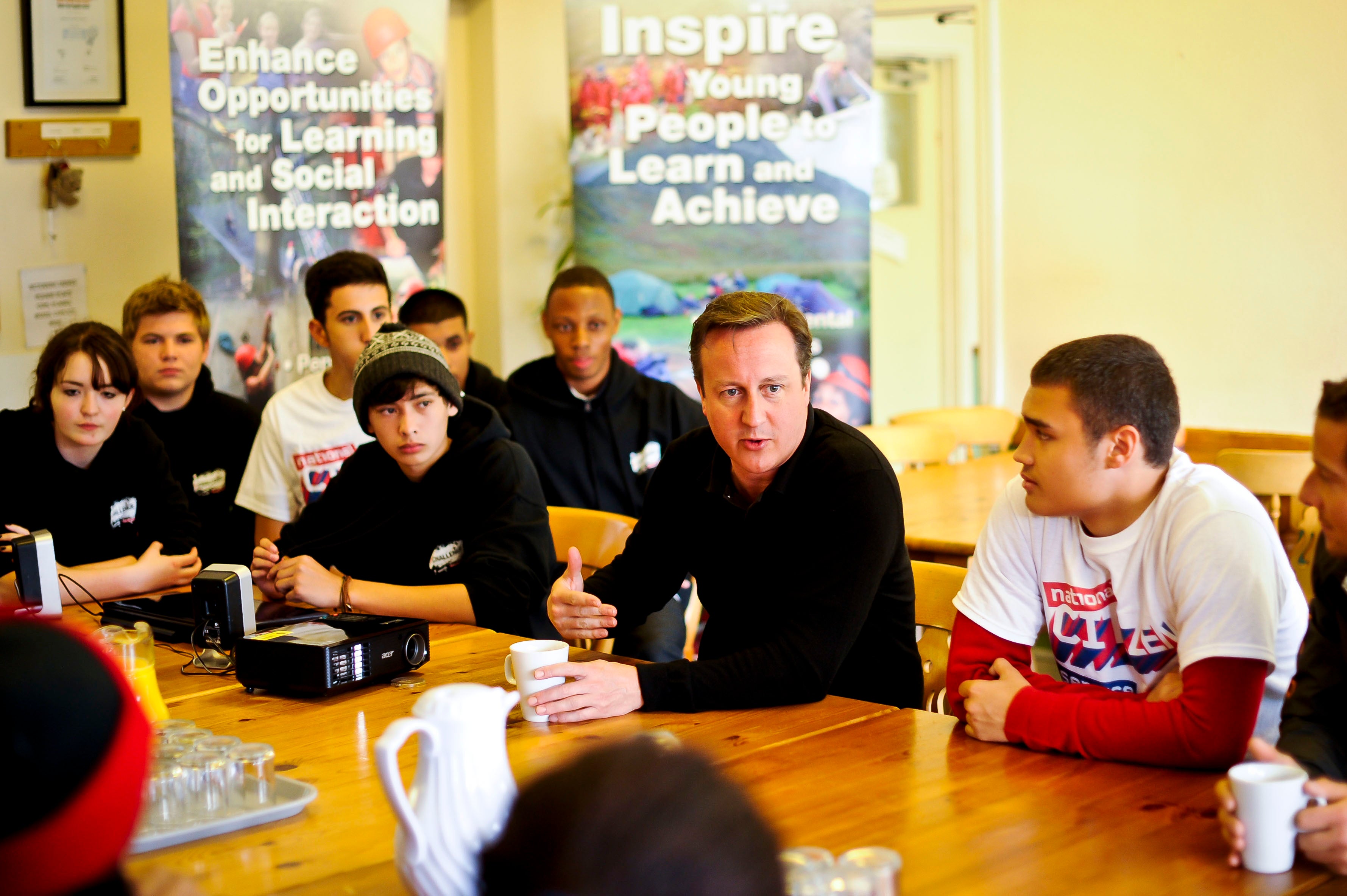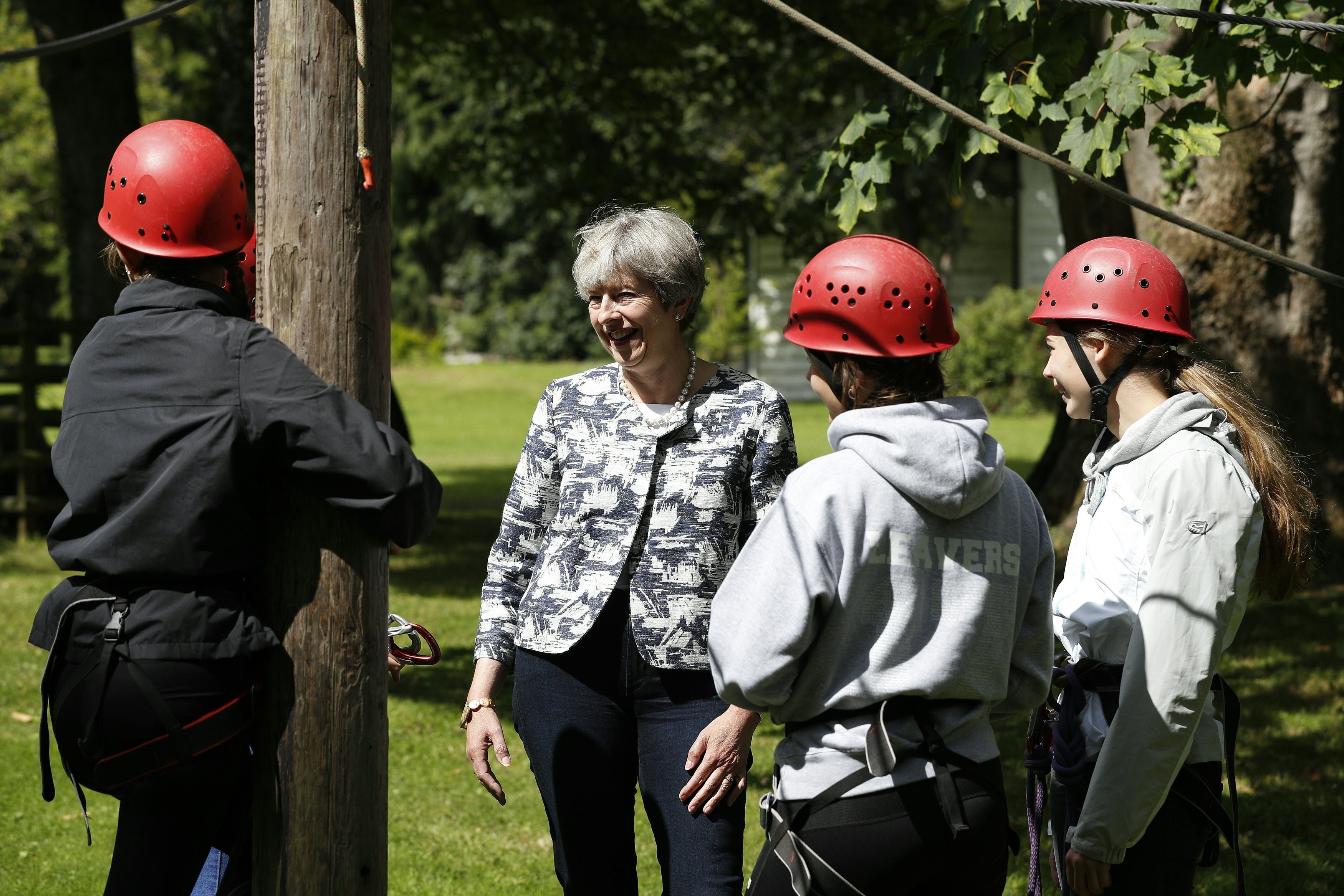David Cameron’s legacy of failure
Special investigation: The former PM’s flagship citizenship project has been handed £1.3bn over the past decade yet is questioned within Whitehall for underperforming. So why does it still receive 90 per cent of the government’s youth budget? David Cohen reports

Your support helps us to tell the story
From reproductive rights to climate change to Big Tech, The Independent is on the ground when the story is developing. Whether it's investigating the financials of Elon Musk's pro-Trump PAC or producing our latest documentary, 'The A Word', which shines a light on the American women fighting for reproductive rights, we know how important it is to parse out the facts from the messaging.
At such a critical moment in US history, we need reporters on the ground. Your donation allows us to keep sending journalists to speak to both sides of the story.
The Independent is trusted by Americans across the entire political spectrum. And unlike many other quality news outlets, we choose not to lock Americans out of our reporting and analysis with paywalls. We believe quality journalism should be available to everyone, paid for by those who can afford it.
Your support makes all the difference.David Cameron’s flagship legacy project, the National Citizen Service, is failing to deliver despite being handed 90 per cent of the government’s youth budget – with concerns in Whitehall that the scheme should now be defunded, The Independent can reveal.
The NCS, of which the former prime minister is chair of patrons, was set up to run summer programmes for 16- and 17-year-olds to help them become better citizens, and has received £1.3bn in taxpayers’ money since 2011.
However, despite warnings as long ago as 2017 that it was failing to deliver value for money, participation has continued to dwindle, while executives take six-figure salaries, with one former board member criticising the programme as little more than “a holiday camp for mostly middle-class kids”.
Cameron, who stepped down as prime minister in 2016, has faced criticism for allegedly contacting the chancellor, Rishi Sunak, in a bid to secure access to the government’s Covid loans scheme for Greensill Capital, a finance firm that has paid him as an adviser. The continued high funding of NCS, which was handed £97.5m of the government’s £113.5m for youth services in the 2021 spending review, has raised questions about Cameron’s continued influence in the Department for Digital, Culture, Media and Sport (DCMS), which is responsible for NCS and the youth budget.
Jo Stevens, the shadow DCMS secretary, said: “There are serious questions for both David Cameron and the government to answer. The former prime minister seems to be under the impression he is still in office. Any abuse of his access to ministers and influence over them makes a mockery of promises of transparency around lobbying. Labour has already asked the cabinet secretary, Simon Case, to investigate serious concerns over the former Tory prime minister's lobbying over Greensill.
“We will be tabling a question in parliament regarding his lobbying over the National Citizen Service.”
Mark Gifford, who became NCS chief executive just before the pandemic struck, said Cameron was a “great source of advice” but “would never interfere” in conversations around funding. Cameron did not respond to a request for comment.
This week the NCS’s annual report warned that the future of the programme was in jeopardy, with the National Audit Office reporting that, given the uncertain outcome of the government’s spring review, there was “material uncertainty” regarding the funding of NCS, casting “significant doubt on the NCS Trust’s ability to continue as a going concern”.
A whistleblower inside DCMS went further, telling The Independent: “NCS has become a running joke in government circles. When the subject is raised, people roll their eyes because it doesn’t work. It’s not delivered value for money, but to defund it after ploughing £1.3bn into it these last 10 years would be to admit failure, so DCMS has kept throwing good money after bad. Now, with austerity biting hard and other youth groups struggling and the government committed to a more levelling-up agenda, it’s a perfect moment for DCMS to shake things up.”
With the project’s future in the balance, The Independent has uncovered concerns at every level of the organisation about how the money is spent and whether the NCS is delivering on its aims.
‘Out of touch’
Cameron’s vision when he founded NCS in 2011 was of a three-week summer programme to make young people aged 16 and 17 better citizens, involving social mixing, a week-long away-from-home residential and life-skills training, culminating in social action delivered by the young people. It was a laudable vision and, with lavish funding, it grew at pace to become the largest youth group for teenagers in the UK.

NCS has enjoyed powerful support, with a board of patrons, chaired by Cameron, that includes TV stars such as Baroness Brady and Bear Grylls; politicians, in the former prime minister and Lord Adonis; and high-profile media figures in former director of BBC news James Harding and ITV’s political editor, Robert Peston.
Yet its flaws were evident well before the pandemic. Top of the government’s concerns has been “poor value for taxpayers’ money”.
A National Audit Office report in 2017 warned that NCS would need to quadruple to 360,000 participants a year by 2020-21 to justify itself as “value for money”.
Jermain Jackman, 26, the first black winner of The Voice, served as youth representative on the NCS board for two years until December 2020. He says the pressure from Whitehall on NCS to grow at a fast rate was not sustainable. “I attended NCS at 16 and have been a passionate supporter of it, so it gives me no pleasure to be critical, but NCS was set up by politicians and civil servants without proper consultation with young people and so it is not surprising it has led to an organisation that is out of touch and struggling to deliver,” he said.
“NCS have national and regional youth boards, but from what I saw and what they told me, the people on the youth boards were not listened to. There was a lot of frustration and people wondered what was the point.
“NCS has failed to cut through to the youth of the country and even after 10 years and hundreds of millions of pounds, too many young people see the programme as a holiday camp for mostly middle-class kids.”
Reaching the right people?
In 2018, just 16 per cent of NCS participants were eligible for free school meals (FSM), compared with the national average of 17.3 per cent. NCS said its 2019 and 2020 FSM rate rose to 22 per cent, and that disadvantaged youths were therefore well represented, but critics say the proportion of young people from low-income households should be much higher. DCMS has also pressed NCS to “work on targeting disadvantaged groups”, with the project claiming in board minutes to be “working hard to target those who were under-represented”.
However, a former NCS employee said: “There was no attempt to specially target disadvantaged young people. If anything, there was a drive to get high-profile private schools on board, including when NCS visited schools like Harrow. We were hardly ever successful. There were also visits to prominent independent schools where David Cameron went along to try to convince them. We would deliver assemblies but not get many sign-ups. It seemed that elite pupils had more attractive summer options than NCS.”

What proportion did NCS feel was the appropriate FSM benchmark to aim for? Miriam Jordan Keane, chief marketing officer for the project, told The Independent: “I will be happy when every young person on free school meals is benefiting.” Asked how many this amounted to, she admitted: “I won’t lie, I don’t know the number.” (The actual number – approximately 66,000 – is about three to four times what they have achieved so far.) Keane added: “For social cohesion, we need to represent all of society, but we should over-index young people who need it most. It’s fair we accept we haven’t done very well in reaching disadvantaged kids.”
People were told to bring swimming gear to go kayaking or sailing, but the place they were sent had no water
Asked the same question, Gifford took a different view. “I am happy we overperform compared to FSM national averages and that it is right to keep it a universal rather than a stigmatised programme. Our performance is strong; our targeting of disadvantaged communities is very good.”
Meanwhile, there have been concerns that the project’s leadership team does not reflect the young people it is purporting to serve. Asked to identify the NCS senior leadership team and whether they are all white, there was a long pause before Gifford said: “I am just thinking how people reference themselves, but from a visual perspective, yes, they’re all white.” Lack of racial and ethnic diversity is problematic, he admitted. “It’s something I have raised with the board since I joined and it’s one of the reasons I initiated for all of NCS to have anti-racism training.” So far, Gifford has made two appointments to the senior leadership team – one permanent, one interim. Both were white.
‘No positive impact’
To achieve value for money according to the National Audit Office report, NCS would have to reduce the cost per participant by 25 per cent, from £1,723 in 2019-20 to about £1,300. There are two things it needs to do to achieve this – dramatically increase participants and radically slash costs. But with participation in decline, value for money seems a receding possibility.
Gifford said: “My job is to drive up volume and drive down costs. I have closed our London headquarters and significantly cut our overheads.” Asked about his plan to boost participation, he said: “I think the days of seeing 100,000 people in a big residential programme have gone.” He added that they were reimagining NCS so that it offered “a portfolio of services that is still awesome” but with “some of it done digitally, depending on what the public purse looks like” and that he hoped 300,000 young people could have “an NCS experience”.
70%
drop in youth funding in the past decade, during which time the NCS has received £1.3bn
The size of the grant to NCS is determined by participation targets set by DCMS and the number of young people signed up to NCS programmes. NCS consistently falls well short of these targets. A former staffer described the pressure to pull in the numbers: “Every year when DCMS announced the target, which in 2019 was around 110,000, there would be a general sigh around the office because we all knew it was not going to happen. That year, around 91,000 young people actually turned up, so we were about 19,000 short. One reason we struggled to hit targets is because some people who have a poor experience on NCS plaster it all over social media, which makes it hard to recruit the following year.”
Read more special reports from our Supporter Programme
The ex-staffer added that issues included “accommodation being sub-standard and not cleaned properly” as well as false advertising. “People were told to bring swimming gear to go kayaking or sailing, but the place they were sent had no water. In one case, a young person in a wheelchair arrived to accommodation that wasn’t wheelchair accessible and they had to move everyone on the fly, but then failed to tell the parents, which caused alarm. Once, so few young people turned up that they were told to invite their friends, which included a 20-year-old who pitched up in his car and caused safeguarding issues.”
Keane said: “Yes, our service has been patchy. We have 129 programme delivery partners countrywide and we have to make our provision as consistent as possible. There is work to be done, but in the main, young people benefit from the experience and feel positive about it.”

Because NCS is offered free or for up to £50 for those who can afford it, many young people sign up for the programme but never turn up. This difference between “sign-ups” and “turn-ups” has cost the taxpayer £25m in the three years to 2019. Keane said: “We have been trying to reduce attrition levels. When there are no-shows, there are certain sunk costs paid to our delivery partners that we can’t recoup – like accommodation already booked and food already ordered.”
An independent report by Kantar for DCMS in 2018 assessed NCS against its key performance indicators – social cohesion, social mobility and social engagement – and found that its autumn programme failed on all counts. In each case, Kantar said it had “no positive impact”, adding that it had no significant impacts “on participants’ trust in others, in the ethnic diversity of their friendship groups, on their positivity towards the future, their wellbeing or loneliness”. Yet NCS has continued regardless, spending over £60m on its two-week autumn programmes in the last three years alone. Gifford said the organisation was reviewing its strategy, and said: “We are working hard to transform the trust, be edgier, and embrace digital more.”
‘No we can’
NCS had to cancel its summer programme last year because of the pandemic, but was still given £82m by government, of which £13m was spent on a repurposed online summer programme that mainly comprised a digital hub called Staying Connected. This hub – meant to keep teenagers “engaged, informed and entertained” – was launched on 20 April and attracted 350,000 unique visitors. But a freedom of information request revealed that the average time they spent on the site was just 91 seconds.
The NCS ex-employee said: “The number of unique site visits is a bit meaningless because NCS spent a fortune on Facebook adverts to drive people to the site, so it was paid marketing that drove the clicks. For the first month, there was just a collection of blogs and videos and enough content to keep you there for maybe 10 minutes, max. They were trying to justify the money they got from government, but it was pathetic.”
750
youth centres closed in the past four years, with 4,500 jobs lost
How can NCS justify a 91-second experience as value for taxpayers’ money? Gifford said: “I absolutely can. That is only one measure. We held the view that the pandemic could be over by May, that the summer would be OK. If you were to ask me, could we have pivoted quicker? That’s a legitimate question. We need to adapt faster to changes in technology and in the lives of young people.”
NCS paid an undisclosed six-figure sum to advertising agency Karmarama to refresh their message in 2019 and the result was a new motto “No we can”. Former board member Jackman said: “The problem with the rebrand was that it tried to make NCS sound rebellious, but it isn’t. Don’t package it as a Transformer if there’s a Barbie inside. The rebrand was an opportunity missed. There are a host of young people on NCS youth boards with tons of ideas. I said, ‘Why not have a £5,000 prize and let them shape it?’ It fell on deaf ears. Our young people’s voices were ignored, causing lots of frustration.”
The NCS ex-staffer said: “The rebranding fiasco went down like a lead balloon in the office. We all thought it was ridiculous. What does ‘No we can’ even mean? Karmarama had done recruitment ads for the army so they thought they knew how to reach that age group, but it was a total flop.” Keane said: “Our former CEO also thought it made no sense, but as I said to him, we are not the target market. Karmarama co-created the campaign with 16- and 17-year-olds. It improved all our brand-tracking metrics – our media sign-ups improved significantly on the back of the rebrand.”
Missing every target
The 2019/20 programme failed to meet any of the NCS’s own key performance indicators for social cohesion, social mobility, leadership and civic engagement
Keane is paid £145,000; the former chief people officer was paid £155,000 plus a company car before she left in 2019; and at least six employees earn over £100,000 a year, according to the annual accounts. An ex-employee told The Independent that the project’s salaries across the board were higher than similar organisations, with their role paying “about 25 per cent” more than the market rate.
So is NCS a gravy train? Gifford, who is paid £150,000, said: “If you are asking whether the NCS should have a review of its pay policy that makes it better aligned to the third sector and takes into account market forces, yes, I agree. The specific salaries you mention were both matters for my predecessor.”
A struggling sector
While NCS’s funding doubled between 2014 and 2020, overall money for the youth services sector has dropped by 70 per cent since 2011. The Local Government Association called for some of NCS’s funding to be given to councils, with a spokesman saying the NCS programme, which lasts two to four weeks, “achieves low participation rates and cannot replace year-round provision”.
The National Youth Agency, which champions the youth sector, also weighed in. Its CEO, Leigh Middleton, said: “NCS delivers social mixing, volunteering opportunities and residential trips; however, with limited funding, a national programme is not the answer.” He called for “funding of local youth provision year-round”.
£1,723
spent per person in the 2019/20 programme. The National Audit Office says anything above £1,314 is not value for money
Some worry that the government will cut NCS funding, yet decline to pass the benefits to the sector. A spokesperson for UK Youth, a network of 8,000 youth organisations, said: “Government can’t just fund NCS, they’ve got to fund a range of services for young people and they need a coherent long-term strategy. To start, they must deliver on their Conservative Party manifesto commitment to invest £500m in youth services.”
Can it continue?
The NCS ex-staffer said: “NCS is full of great, passionate people but it has been badly let down by the people at the top. Mark Gifford is a new broom and has a reforming agenda, but he got side-swiped by the pandemic, which hit within weeks of his arrival. You have to feel sorry for him – but there are a lot of people on the senior leadership team who are poor and you wonder how they got there.”
Jackman said that Gifford’s appointment, at least, gave cause for hope. He said: “Things under Mark have improved: he put the entire organisation through anti-racism training after I brought it to their attention, staff morale has improved and young people on the youth boards feel more heard on his watch. He has done remarkably well in his first year, but the amount of money poured into NCS is jaw-dropping and at a time when youth services for hard-to-reach young people have been decimated, it seems right to ask: what does the future of NCS look like?”
Gifford had no public or youth sector experience, but came with a strong “operational” background after 20 years at Waitrose and John Lewis and is said to be “focused on costs” and “running a tight ship”. He hopes their regular summer and autumn programmes can go ahead and – Covid permitting – is targeting 60,000 to physically attend this year.
What will happen next is DCMS’s call, but it’s not simple, because as the August minutes for NCS made clear, “defunding and, in effect, closing NCS would cost [the taxpayer] circa £70m”.
The DCMS whistleblower said: “This is a genuine moment for us to re-evaluate NCS and see it in context of how we fund the youth sector as a whole. A whole spectrum of options will be considered. Moving forward, I suspect funding might have to be more evenly spread.”
Officially, however, DCMS remains tight-lipped. Asked when we can expect their spring review report to be published, a spokesperson said: “The review will take place through the spring and the findings will be made public at the appropriate time.”
Join our commenting forum
Join thought-provoking conversations, follow other Independent readers and see their replies
Comments